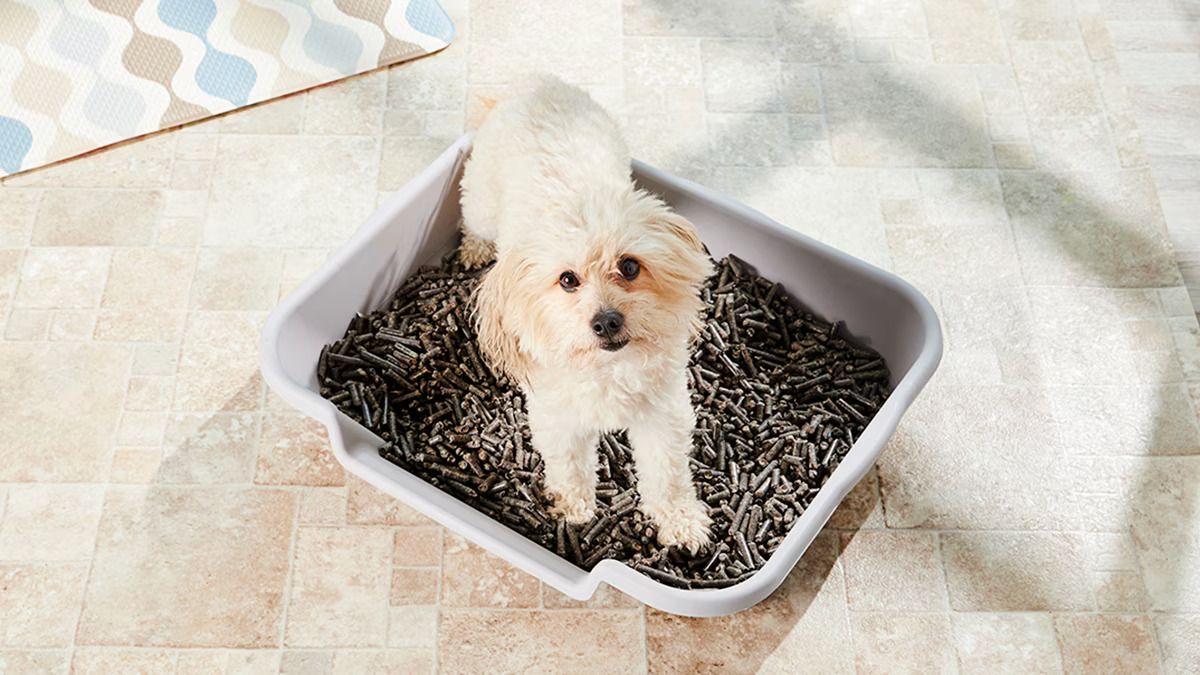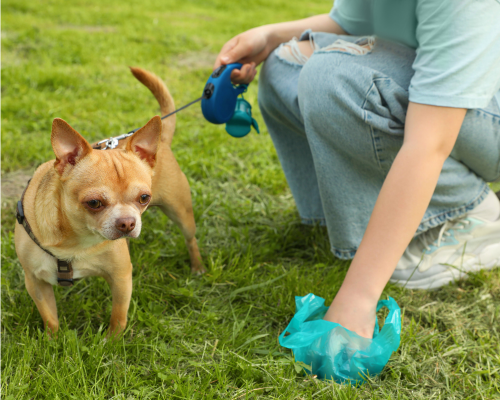Can Dogs Use Litter Boxes? Why Don't They?
Can Dogs Use Litter Boxes? Why Don't They?

Vet Reviewed

By: Sarah Hodgson
May 20, 2023
Table of Contents
Wouldn't it be nice if our dogs could take care of their business indoors, just like cats do? All we'll have to do is set up a nice litter box in the corner and leave them to do their business.
Well, In this article, we'll explore why dogs don't use litter boxes and the reasons behind so. With that said let's dive in!
Can Dogs Use Litter Boxes?
Before we jump into the article, can dogs even use litter boxes? The short answer is yes, dogs can use litter boxes.
However, it is important to note that not all dogs will readily adapt to litter boxes. Cats have a natural instinct to use litter boxes due to their ancestral history. They have evolved to bury their waste to avoid attracting predators. Dogs, on the other hand, have a different set of instincts and preferences that make them less inclined to use litter boxes. That's why most dogs don't have or use litter boxes.
Why Don't Dogs Use Litter Boxes
Now, don't get me wrong dogs can use litter boxes. However, they prefer not to, and that's why most dogs don't. However, it's not only a preference there are a couple of reasons.
Reasons dogs don't prefer litter boxes include:
Can't Mark Their Scent
One of the main reasons why dogs don't use litter boxes is because they can't mark their scent. Dogs are territorial animals and rely on their urine and feces to mark their territory. By leaving their waste uncovered, they are sending a clear message to other animals that this area is theirs. Litter boxes eliminate this opportunity for marking, which may be a significant deterrent for dogs.
Prefer The Outdoors

Dogs are naturally inclined to relieve themselves outdoors. They enjoy the freedom and space that the outdoors provide, allowing them to explore and find the perfect spot to do their business. Dogs also have a keen sense of smell and are stimulated by the scents and stimuli present in the environment. The confinement of a litter box may not provide the same sensory experience that dogs prefer.
The Smell
Another reason why dogs may not use litter boxes is the smell. Dogs have a highly sensitive sense of smell, and the odor of a litter box can be overwhelming for them. Litter boxes need to be cleaned frequently to prevent odor buildup, which can be challenging for busy dog owners. The strong smell of urine and feces may discourage dogs from using the litter box altogether.
Natural Instinct To Bury Their Waste
Unlike cats, dogs have a natural instinct to bury their waste. This behavior is rooted in their ancestral history as pack animals. By burying their waste, dogs are able to prevent the spread of their scent and avoid attracting predators. Litter boxes do not provide the same opportunity for dogs to engage in this instinctual behavior, making them less likely to use them.
Size Doesn’t Work For Most Dogs
Lastly, the size of litter boxes may not suit most dogs. Dogs come in various sizes, and litter boxes designed for cats may be too small for them. Dogs need enough space to comfortably turn around and assume the preferred position for elimination. Additionally, larger dogs may have difficulty fitting into a litter box, further discouraging them from using it.
Dogs Need Exercise
Dogs need and enjoy moving around. They need the exercise of daily walks without it they would go totally nuts. Now it's different for every breed but most dogs need the running digging and chewing which a litter box will not provide.
The Pros and Cons of Litter Boxes For Dogs
I thought I'd put a list together showing both sides of the story as there are advantages as well as disadvantages to litter boxes for dogs.
Advantages
- Convenient for dog owners with limited mobility or those living in apartments without yards.
- Reduces the need for outdoor potty breaks during ugly weather.
- Beneficial for senior dogs, special needs dogs, or puppies in the process of house training.
Disadvantages
- Daily cleaning and litter replacement can be time-consuming and expensive.
- Litter boxes can be messy and emit unpleasant odors especially if you have a large dog.
- Not suitable for dogs prone to digging, chewing, or coprophagia (eating poop).
- Most dogs may struggle to fit comfortably in a litter box.
Can You Train Your Dog To Use Litter Boxes?
Yes, you can train your dog to use litter boxes especially if you have a smaller dog as they fit more litter box sizes. However, as dogs grow older and more infirm dogs will need the exercise to explore the outside world and will prefer the outdoors.
While dogs can use litter boxes, it's important to remember that taking them for walks to go potty should still be a top priority. If you're thinking about getting a litter box, keep outdoor walks as the main way for them to do their business.

How To Start Litter Box Training A Dog
Litter box training a dog requires patience and consistency. Here are some steps to help you get started:
- Choose the right litter box: Ensure that the litter box is large enough for your dog and has a low entry point for easy access. Consider the material of the litter box and choose one that is easy to clean and maintain.
- Introduce the litter box gradually: Place the litter box in an area where your dog spends a lot of time. Allow your dog to explore the litter box and get familiar with it. Reward your dog with treats and praise when they approach or sniff the litter box.
- Encourage elimination in the litter box: When you notice your dog showing signs of needing to eliminate, gently guide them to the litter box. Use positive reinforcement and reward your dog for using the litter box.
- Clean the litter box regularly: Dogs are sensitive to smells, so it is crucial to keep the litter box clean. Remove waste promptly and clean the litter box regularly to prevent odor buildup.
- Be patient and consistent: Litter box training takes time, and accidents may happen. Stay patient and continue to reinforce positive behavior. Consistency is key in helping your dog understand that the litter box is the designated area for elimination.
Some tips when litter box training a dog:
- Add sod or artificial grass to the box, as most dogs prefer this substrate. Replace it periodically.
- Take your dog to the litter box whenever they show signs of needing to eliminate their waste, such as circling, sniffing the ground, or hiding under furniture.
- Keep the litter box clean by scooping waste regularly and replacing the litter at least twice a month.
- Reward your dog when they eliminate their waste in the litter box to encourage more of that behavior.
Outdoor Dog Litter Box Vs Indoor Dog Litter Box
If you are considering using a litter box for your dog you can and you have the option of choosing between an outdoor or indoor dog litter box.
Outdoor dog litter boxes are typically larger and allow dogs to have the freedom and space they desire. They can be placed in a designated area of your yard and are usually made of durable materials that can withstand the elements.
Indoor dog litter boxes, on the other hand, are designed to be used inside the house or apartment. They are often smaller in size and can be placed in a discreet location. The choice between an outdoor or indoor dog litter box depends on your dog's needs and your living situation.
What To Look For In a Litter Box For Dogs
If you're ready to start using a litter box and are interested in getting one there are a couple of things you should keep in mind when choosing:
- The Size: Ensure that the litter box is large enough for your dog to comfortably turn around and assume their preferred position for elimination.
- Low Entry: Look for a litter box with a low entry point to make it easy for your dog to access.
- Durability: Choose a litter box made of durable and easy-to-clean materials. Consider the type of litter that is compatible with the litter box and your dog's preferences.
- Odor control: Look for a litter box with features that help control odor, such as a covered design or odor-absorbing materials.
- Accessibility: If you have an older or disabled dog, consider a litter box with ramps or low sides to make it easier for them to enter and exit.
The Bottom Line
So there you have it, while dogs may not naturally like using litter boxes like cats, they can use them and it's possible to train them to do so with patience and dedication.
Note
Keep in mind litter boxes may not be the ideal solution for all dogs, especially larger breeds or those with specific behavioral issues. Ultimately, it's up to you to decide if litter boxes are right for your dog.

Subscribe to Petfluence!
Get updates on the latest posts and more from Petfluence straight to your inbox.